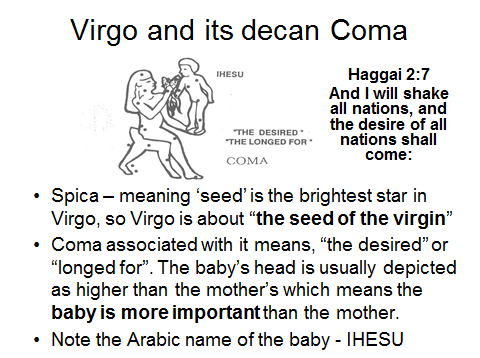I firmly believe that the Zodiac sign or constellation of Virgo was named and drawn by the first prophets of Lord God, based upon the protoevangelium,* and details the basic facts of the gospel of redemption. In Job "Mazzaroth" (the Zodiac or twelve constellations of the circular heavens) is spoken of as being of God and having messages and a story connected with them. (See Job 38:31-32)
*or the first good news promise of a savior and redeemer found in the words of God to the Serpent - “I will put enmity between you and the woman; and between your offspring and her offspring; he shall bruise your head, and you shall bruise his heel” - Gen. 3:15
The following citations are from my former posting on this subject (here). Under "The Sign Of Virgo" J. A. Seiss wrote:
"I begin with Virgo, which I take to be the first sign in the Zodiac, according to its original intent and reading. The Zodiac of Esne begins with this sign. The story has no right starting-point, continuity, or end except as we commence with this constellation. I also have the statement from the best authorities that the custom was universal among the ancients to reckon from Virgo round to Leo. And in this sign of Virgo, if anywhere among the starry groups, we find the primary idea in the evangelic presentations."
"The initiative sign of the Zodiac is called Virgo, The Virgin. All the traditions, names, and mytholgies connected with it recognize and emphasize the virginity of this woman. Astrea and Athene of Greek story identify with her.
In Hebrew and Syriac she is Bethulah, the maiden. In Arabic she is Adarah, the pure virgin. In Greek she is Parthenos, the maid of virgin pureness. Nor is there any authority in the world for regarding her as anything but a virgin."
"But the greater wonder is, that motherhood attends this virginity, in the sign the same as in the text..."
"And this maiden in the sign is the holder and bringer of an illustrious Seed; In her hand is the spica, the ear of wheat, the best of seed, and that spica indicated by the brightest star in the whole constellation. He who was to bruise the Serpent's head was to be peculiarly "the Seed of the woman," involving virgin-motherhood, and hence one born of miracle, one begotten of divine power, the Son of God. And such is the exhibit in this first sign of the Zodiac. She is a virgin, and yet she produces and holds forth a Seed contemplated as far greater than herself. That seed of wheat Christ appropriates as a symbol of himself. When certain Greeks came to Philip wishing to see Jesus, He referred to himself as the corn, or seed, of wheat, which needed to fall and die in order to its proper fruitfulness (John 12: 21—24).
"Thus, according to the starry sign, as according to the Gospel, out of the seed of wheat, the good seed of the Virgin, the blessed harvest of salvation comes."
"A very significant figure of Christ, much employed by the prophets, was the branch, bough, or sprout of a plant or root. Hence He is described as the Rod from the stem of Jesse and the Branch out of his roots (Isa. 11 : i), the Branch of Righteousness, the Branch 'of the Lord, God's servant The Branch (Isa. 4:2; Jer. 23 : 5 ; Zech. 3:8; 6:12). And so this sign holds forth the Virgin's Seed as The Branch. In addition to the spica in one hand, she bears a branch in the other. The ancient names of the stars in this constellation emphasize this showing, along with that of the Seed. Al Zimach, Al Azal, and Subilon mean the shoot, the branch, the ear of wheat. The language of the prophecies is thus identical with the symbols in this sign."
"It is a doctrine of our religion that without Christ, and the redemption wrought by Him, all humanity is fallen and helpless in sin. There is none other name given among men whereby we can be saved.
Even Mary herself needed the mediatorial achievements of her more glorious Son to lift her up to hope and standing before God. And this, too, is here signified. This woman of the Zodiac lies prostrate. She is fallen, and cannot of herself stand upright. Christ alone can lift up to spiritual life and standing. This woman accordingly holds forth the goodly Seed, the illustrious Branch, as the great embodiment of her hope and trust, the only adequate hope and trust of prostrate and fallen humanity.
And what is thus vividly signified in this constellation is still further expressed and defined by the Decans, or side-pieces, which go along with it."
The great and learned Bullinger wrote:
"The name of this sign in the Hebrew is Bethulah, which means a virgin, and in the Arabic a branch. The two words are connected, as in Latin--Virgo, which means a virgin; and virga, which means a branch (Vulg. Isa 11:1). Another name is Sunbul, Arabic, an ear of corn.
In Genesis 3: 15 she is presented only as a woman; but in later prophecies her nationality is defined as being of the stock of Israel, the seed of Abraham, the line of David; and, further, she is to be a virgin. There are two prominent prophecies of her and her seed..."
"Behold, a virgin shall conceive and bear a son,
And shall call his name Immanuel." (Isa. 7: 14)
"For unto us a child is born, Unto us a son is given; And the government shall be upon His shoulder; And His name shall be called Wonderful, Counsellor, The Mighty God, The Everlasting Father, The Prince of Peace. Of the increase of His government there shall be no end. Upon the throne of David, and upon His kingdom, To order it, and to establish it With judgment and with justice From henceforth even for ever. The zeal of the LORD of hosts will perform this." (Isa. 9: 60)
"...the brightest star in VIRGO (a) has an ancient name, handed down to us in all the star-maps, in which the Hebrew word Tsemech is preserved. It is called in Arabic - Al Zimach, which means the branch. This star is in the ear of corn which she holds in her left hand. Hence the star has a modern Latin name, which has almost superseded the ancient one, Spica, which means, an ear of corn. But this hides the great truth revealed by its name Al Zimach. It foretold the coming of Him who should bear this name. The same Divine inspiration has, in the written Word, four times connected it with Him. There are twenty Hebrew words translated "Branch," but only one of them (Tsemech) is used exclusively of the Messiah, and this word only four times (Jer 33:15 being only a repetition of Jer 23:5). Each of these further connects Him with one special account of Him, given in the Gospels."
"The star b is called Zavijaveh, which means the gloriously beautiful, as in Isaiah 4: 2. The star e, in the arm bearing the branch, is called Al Mureddin, which means who shall come down (as in Psa 72:8), or who shall have dominion. It is also known as Vindemiatrix, a Chaldee word which means the son, or branch, who cometh."
"The Hebrew word ‘Zerah’ (the alpha star) is the word used to describe Messiah to Adam and Eve in Genesis 3:15 and to Abraham in Genesis 15:5...the seed, “zerah” was a direct reference to the coming Messiah."
Other names of stars in the sign, are--
Subilah, who carries. (Isa 46:4)
Al Azal, the Branch. (As in Isa 18:5)
Subilon, a spike of corn. (As in Isa 17:5)
Under "The Desired One (Coma)" Seiss wrote:
"The Gospel in the Stars: Or, Prímeval Astronomy" By Joseph Augustus Seiss (here)
"The prophets are also very emphatic in describing the promised Saviour as the Desired One, "the Desire of women," "the Desire of all nations." So the name of this first Decan of Virgo is Coma, which in Hebrew and Oriental dialects means the desired, the longed-for —the very word which Haggai uses where he speaks of Christ as "the Desire of all nations.-' The ancient Egyptians called it Shes-nu, the desired son. The Greeks knew not how to translate it, and hence took Coma in the sense of their own language, and called it hair— Berenice's Hair. The story is, that that princess gave her hair, the color of gold, as a votive offering for the safety of her brother; which hair disappeared. The matter was explained by the assurance that it was taken to heaven to shine in the constellation of Coma. Hence we have a bundle of woman's hair in the place of " the Desire of all nations." (pg. 77)
So, how old is the gospel message about Jesus the Messiah? Does it not go back to the beginning?



